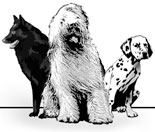All the statements in blue boxes below are copied directly (typos included) from websites that proclaim
"We Can Train Any Dog!"I bet every community has at least one trainer who advertises his or her business using a statement similar to this one!
At first glance, it would seem like this is a great claim, no? It’s kind of like saying, “We can unclog any drain!” The only trouble is, dogs aren’t pipes. They are living, thinking, feeling beings, and they depend on us for their well-being and survival. Survival means food, water and shelter (and nowadays, vaccines), but well-being is a totally different story. Dogs are born with different temperaments (personalities) and are shaped into what they currently are through life experiences. Socialization, mental and physical stimulation, and trusting relationships with humans go a long way toward making a dog ‘whole’.
Website Example #1
We can take your dog from unruly to disciplined, from ordinary to extraordinary, from special to exceptional. Have a dog that is too aggressive? We can train him to be gentle. Is your dog uncontrollable? We can teach her to be submissive. Does your dog keep running away? Let us teach him to STAY.
What does this have to do with a trainer claiming that he or she can train ANY dog? In some cases, this claim may actually be true. But there should be concern there that every dog is treated just the same as every other dog, regardless of any challenges or issues the dog may have. Should an overly excited dog be trained in the same manner as the fearful dog or the pushy dog? In some cases, maybe, but not in all cases. How does the trainer know that? How do you, as the consumer, know that?
This is where knowledge comes into play. When I was learning to be a trainer, I learned from a man who treated all dog issues the same way…through harsh collar corrections on a choke chain or a prong collar. I saw fearful toy poodles receive the same harsh corrections as the resource guarding cocker spaniel and the friendly Rottweiler. The premise was that the poodle needed a leader, and he’d be happier if he knew who was boss. What the dog really needed was some careful socialization and counter conditioning. The premise for the cocker spaniel was the same: harsh corrections imparted a message of leadership. The trainer got bit. A lot. The cocker would have improved with some management, training, a better diet, and again, counter conditioning. The friendly Rottweiler seemed least bothered by the corrections, and he did learn some manners, but he didn’t pay much attention to his owner.
Website Example #2
We teach you technique to get Maximum results in a Minimalamount of time. All of our training is 1 on 1 so you have our complete attention. We also use various dogs as well as other things for distraction work. We are Veterinary Recommended! We use Dog Psychology in the same manner and fashion as The Dog Whisperer, we utilize many of his very techniques. We work with All Dogs ranging from Puppies to “Last Chance Dogs.”
The trainer didn’t have a good understanding of behavior problems; matter of fact he had no understanding of behavior problems. He believed that all dogs needed the same treatment, and that’s what they got. The result was that the first dog shut down and didn’t do much of anything, the second dog lived a very stressed life, and the third dog didn’t much care for his owner. Having a great working knowledge of behavior problems and being able to work them on an individual basis is a very different thing than knowing one set of skills and applying them to every problem.
If you are going to trust a trainer with your dog and his or her particular issues, it is your responsibility to interview the trainer about his or her knowledge and approach. Dog training is not a regulated industry, so anyone can hang a shingle and call himself a dog trainer. There are ways that you can make an educated decision about a dog trainer. Below are some guidelines for you:
- Ask the trainer what his educational background is regarding working with dogs. A bachelor’s degree is not required, but post secondary education is a plus. She should tell you that she belongs to one of the major dog trainers’ organizations (APDT, IAABC, IACP, NADOI).
- A good trainer probably reads regularly and attends conferences and seminars.
- The CCPDT certifies dog trainers, as does the IAABC. Find out if they are certified.
- A good trainer understands “The Four Quadrants” of behavior. Behavior is behavior is behavior, regardless of species.
- Observe a class that the trainer teaches. If you ask permission to observe, the answer should be an immediate Yes! If the trainer doesn’t allow you to observe (without your dog), move on. This may be a bit more difficult if you are looking for private lessons and the trainer only does private lessons because this involves liability and the permission of the student you’d be observing.
- Speaking of liability, the trainer should have dog trainer’s insurance. Ask them what company they use.
Website Example #3
If your dog has dominance issues, you definitely need professional help. Don't be fooled by amateur and hobbyist dog trainers into believing group obedience classes will help. They almost always make it worse. Giving an aggressive or dominant dog food to train it is extremely dangerous.
While it certainly is possible to find a trainer who really can train any dog, the question should be, “Can you train any dog effectively?” What is the definition of a well-trained dog? I’d say that it’s a dog who happily responds to the owner’s requests, a dog who respects his owner and whose owner respects him. If a dog is trained effectively, there should be no negative fallout such as stress. It’s up to you to investigate a trainer before using him. Your dog is counting on you to make the right decisions for him…you owe it to him!
Also see our article on "Positive Dog Training Myths." Should trainers who use "corrections" on dogs be able to call themselves "positive"?
Please read the AVSAB (American Veterinary Society of Animal Behavior) statement on dominance training.
http://www.avsabonline.org/avsabonline/images/stories/Position_Statements/dominance%20statement.pdf
Click here to go to the Training Tips page.
We Can Train Any Dog!



